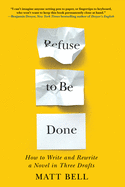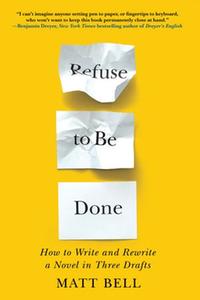
 Many bookshelves sag under the weight of creative writing instruction manuals, but few are as engaging--in little more than 150 pages--as Matt Bell's Refuse to Be Done: How to Write and Rewrite a Novel in Three Drafts. Bell (Appleseed), professor of creative writing at Arizona State University and the author of three novels, has written an enthusiastic and highly practical guide to completing this challenging artistic effort successfully.
Many bookshelves sag under the weight of creative writing instruction manuals, but few are as engaging--in little more than 150 pages--as Matt Bell's Refuse to Be Done: How to Write and Rewrite a Novel in Three Drafts. Bell (Appleseed), professor of creative writing at Arizona State University and the author of three novels, has written an enthusiastic and highly practical guide to completing this challenging artistic effort successfully.
The subtitle of Bell's book is a bit misleading, but only in the sense that he's not suggesting it's realistic to expect to create a publishable novel in a mere three drafts. Instead, what he advocates is a three-step process that will help any writer, from novice to experienced author, proceed in an orderly way that's designed to result in a finished product that represents the author's best work.
The first section of Refuse to Be Done is its lengthiest and most stimulating. In it, Bell describes an array of strategies designed to help the aspiring novelist continue to generate fresh material. The goal here is simply to get words on paper. Whether it's "writing the islands" (the "big scenes you already know, no matter how far off they seem") or turning to writing exercises to spark creativity, Bell believes that "as long as you keep writing, you'll make it."
Bell, who's not a proponent of outlining before beginning a novel, strongly advocates for that process at the beginning of the work's second stage. This outline is "less a document of what exists and more a plan for the better book you want the second draft to be, discovered among the material of the first draft's more organic creation." Bell adds the somewhat unusual recommendation to retype the entire novel from scratch at this stage, arguing that "this process will divorce you from the sentences you wrote while you were figuring out what your novel was."
In his final section, Bell offers a host of helpful practices for tightening a manuscript, which he concedes the writer may be weary of confronting by this point, to create a highly polished work. At this stage, he argues, it's especially important for writers to "refuse to be done," finally urging them to read the novel aloud one last time, "a beautiful gift you can give yourself, before you give the gift of your novel to everyone else."
Bell concludes by observing that the process of novel writing is its own reward. By implementing even some of his myriad of sound and ingenious tips, any writer almost certainly will find that journey a more rewarding one. --Harvey Freedenberg, freelance reviewer
Shelf Talker: Matt Bell's compact guide to writing novels is packed with useful strategies and tips to help improve any writer's finished product.

